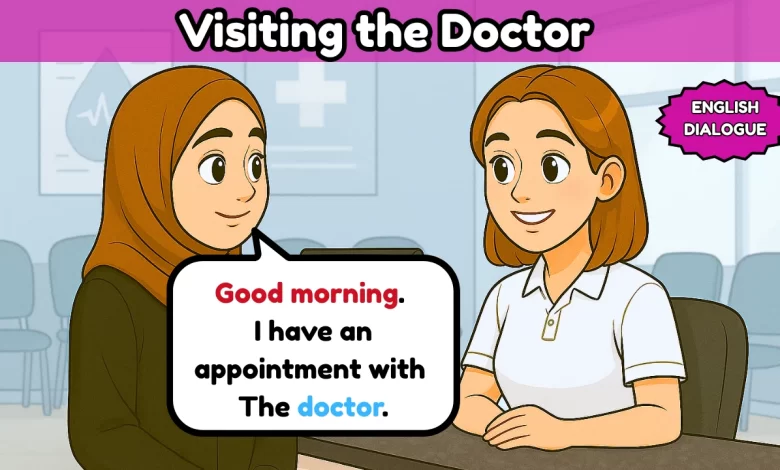
Learning how to talk to a doctor in English is very important, especially for travelers and students living abroad. In this lesson, you will read one of the most useful short English dialogues — a visit to the doctor.
This simple and clear conversation will help you learn how to describe your symptoms, understand basic medical advice, and use polite sentences in real-life situations. It’s perfect for daily English conversation practice for beginners who want to improve their speaking confidence.
Situation: Feeling Unwell
Emma has not been feeling well for a few days. She has a sore throat, a slight fever, and a headache. She decides to visit a nearby clinic to see a doctor.
This short English dialogue shows how to describe symptoms, answer the doctor’s questions, and understand simple medical advice.
Watch the Video
🎥 Watch the full video below and repeat the sentences to practice speaking:
💬 Conversation Summary
In this simple English dialogue conversation, Emma greets the doctor and explains her problem:
“Good morning, doctor. I’ve had a sore throat for two days and a little fever.”
The doctor asks a few questions:
“Do you have a cough or any other symptoms?”
Emma replies:
“Yes, I have a mild cough, and my body feels weak.”
The doctor checks her temperature and says:
“You have a mild infection. Drink a lot of water, take these medicines, and rest for two days.”
Emma thanks the doctor politely and says goodbye.
🩹 Useful Phrases at the Doctor’s Office
- Good morning, doctor.
- I don’t feel well.
- I have a headache / sore throat / fever.
- How long have you been sick?
- Take this medicine twice a day.
- Get some rest and drink plenty of water.
These are some of the most common and useful sentences you can use during a medical visit.
Vocabulary Focus
| Word | Meaning | Example |
|---|---|---|
| Sore throat | Pain in the throat | I can’t swallow easily because of my sore throat. |
| Fever | High body temperature | She has a fever and feels weak. |
| Medicine | Something you take to feel better | Take your medicine after meals. |
| Rest | Relax to recover | The doctor told me to rest for two days. |
| Clinic | A small medical center | I visited the clinic near my home. |
Grammar and Speaking Tips
When describing your illness, use the present perfect or simple present tense:
✅ “I’ve had a headache since yesterday.”
✅ “I feel weak and tired.”
Always use polite forms when speaking with a doctor:
“Could you please tell me what’s wrong?”
“What should I do to feel better?”
You can also practice pronunciation by saying the sentences slowly and clearly.
Common Mistakes to Avoid
1️⃣ Saying “I am cold” when you mean “I have a cold.”
👉 “I am cold” means you feel low temperature.
👉 “I have a cold” means you are sick with a virus.
2️⃣ Forgetting to use “a” or “the”:
❌ “I have fever.” → ✅ “I have a fever.”
3️⃣ Using strong or rude tone.
Always speak gently: “Excuse me, doctor,” “Thank you very much,” etc.
4️⃣ Mixing symptoms:
Be specific — say “sore throat” or “stomach pain” instead of just “pain.”
Practice Activity
Create your own short English dialogue between a doctor and a patient.
Use at least three of these phrases: I don’t feel well, How long have you been sick?, Take this medicine, Get some rest.
Practice aloud twice a day — this is great daily English conversation practice for beginners.
Final Thoughts
Visiting the doctor is a situation we all experience. Learning to talk about your symptoms in English helps you stay calm and confident when you need medical help.
Keep practicing simple English dialogue conversations like this one to improve your speaking and listening skills. You’ll soon be able to express yourself naturally in any real-life situation.
👉 Don’t forget to watch more short English dialogues and daily English conversation lessons on our YouTube channel Minute English!
